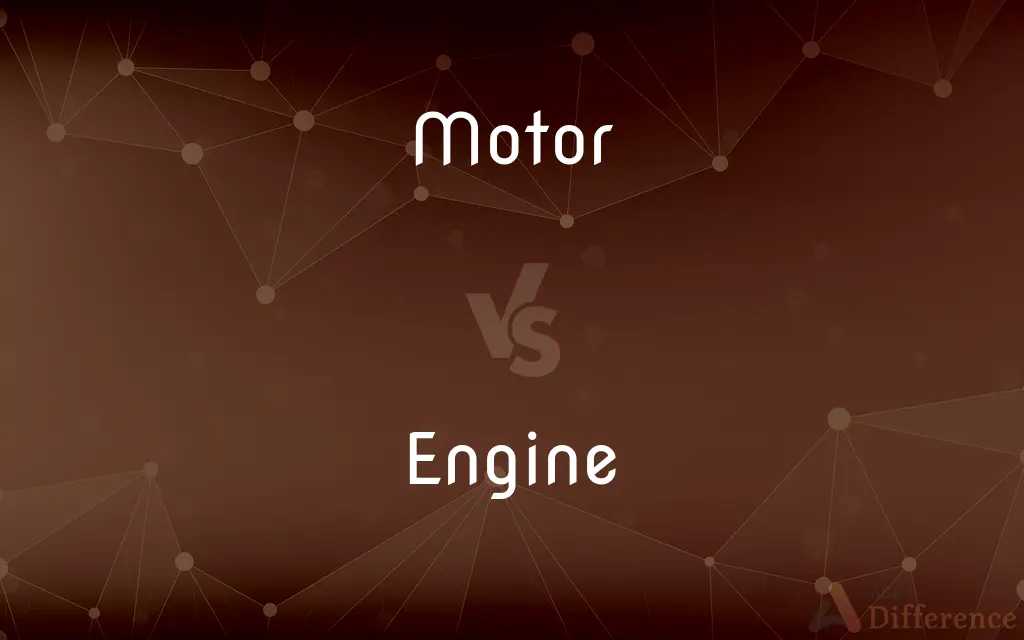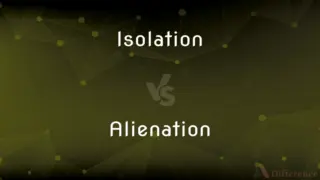Motor vs. Engine — What's the Difference?
By Fiza Rafique & Urooj Arif — Updated on March 30, 2024
A motor converts electrical energy into mechanical energy, while an engine converts various forms of energy into mechanical energy, often involving combustion.

Difference Between Motor and Engine
Table of Contents
ADVERTISEMENT
Key Differences
Motors are devices designed to convert electrical energy into mechanical motion, powering a wide range of appliances and vehicles with precision and efficiency. Engines, on the other hand, are more traditionally associated with the conversion of chemical energy, especially from fuels like gasoline or diesel, into mechanical energy, driving vehicles and machinery with high power output.
While motors are often associated with cleaner, more sustainable energy sources such as electricity, engines are typically linked to the combustion of fossil fuels, contributing to carbon emissions. However, advancements in technology are seeing engines become more efficient and less polluting, whereas motors are becoming more powerful and versatile, bridging the gap between the two in terms of environmental impact and application.
The operation of motors is generally quieter and requires less maintenance due to fewer moving parts and the absence of combustion processes. Engines, in contrast, involve complex mechanisms with internal combustion, leading to higher noise levels, vibrations, and more frequent maintenance needs to ensure optimal performance and longevity.
In terms of efficiency, motors often have a higher efficiency rate, converting more of the electrical energy into mechanical energy, whereas engines, especially internal combustion engines, may lose a significant portion of energy through heat and friction losses. This distinction makes motors more appealing for applications where efficiency is a critical factor, such as in electric vehicles and industrial machinery.
Motors and engines both play crucial roles in powering the world, but they cater to different needs and applications. Motors are becoming increasingly prominent in the shift towards renewable energy and electrification, while engines continue to be indispensable in sectors where high power output and energy density are paramount.
ADVERTISEMENT
Comparison Chart
Energy Conversion
Converts electrical energy into mechanical energy.
Converts chemical (and other forms) energy into mechanical energy.
Common Uses
Electric vehicles, appliances, industrial machines.
Automobiles, aircraft, ships, generators.
Energy Source
Electricity.
Fossil fuels (gasoline, diesel), biofuels, natural gas.
Environmental Impact
Generally lower, especially if powered by renewable energy.
Higher due to combustion emissions, but improving with new technologies.
Maintenance
Lower due to fewer moving parts and no combustion.
Higher due to combustion and more complex components.
Compare with Definitions
Motor
Features high efficiency and low emissions.
Electric motors in cars provide efficient power with zero tailpipe emissions.
Engine
A machine designed to convert various forms of energy into mechanical force.
The car's gasoline engine converts fuel into motion.
Motor
A device that converts electrical energy into mechanical motion.
An electric motor powers the fan to circulate air.
Engine
Predominantly runs on the combustion of fuel.
Diesel engines power trucks by burning diesel fuel.
Motor
Often used in applications requiring precise control.
Motors in robotic arms enable precise movements for assembly tasks.
Engine
Requires regular maintenance to manage wear and emissions.
Engine oil changes are crucial for maintaining car engine performance.
Motor
Key component in electric vehicles and machinery.
Motors are the driving force behind the propulsion of electric vehicles.
Engine
Continuously evolving to become more efficient and cleaner.
Hybrid engines combine combustion and electric power for efficiency.
Motor
Can be powered by direct current (DC) or alternating current (AC).
Household appliances typically use AC motors.
Engine
Integral to transportation and industrial machinery.
Jet engines propel airplanes by generating thrust.
Motor
Something, such as a machine or an engine, that produces or imparts motion.
Engine
An engine or motor is a machine designed to convert one form of energy into mechanical energy. Heat engines convert heat into work via various thermodynamic processes.
Motor
A device that converts any form of energy into mechanical energy, especially an internal-combustion engine or an arrangement of coils and magnets that converts electric current into mechanical power.
Engine
A machine with moving parts that converts power into motion
Engine failure
The roar of a car engine
Motor
A motor vehicle, especially an automobile
"It was a night of lovers. All along the highway ... motors were parked and dim figures were clasped in revery" (Sinclair Lewis).
Engine
A locomotive.
Motor
Causing or producing motion
Motor power.
Engine
A machine that converts energy into mechanical force or motion.
Motor
Driven by or having a motor.
Engine
Such a machine distinguished from an electric, spring-driven, or hydraulic motor by its use of a fuel.
Motor
Of or for motors or motor vehicles
Motor oil.
Engine
A mechanical appliance, instrument, or tool
Engines of war.
Motor
Of, relating to, or designating nerves that carry impulses from the nerve centers to the muscles.
Engine
An agent, instrument, or means of accomplishment.
Motor
Involving or relating to movements of the muscles
Motor coordination.
A motor reflex.
Engine
A locomotive.
Motor
To drive or travel in a motor vehicle.
Engine
A fire engine.
Motor
To carry by motor vehicle.
Engine
(Computers) A search engine.
Motor
A machine or device that converts other energy forms into mechanical energy, or imparts motion.
Engine
To equip with an engine or engines.
Motor
(colloquial) A motor car, or automobile, even a goods vehicle.
Nice motor!
Engine
A large construction used in warfare, such as a battering ram, catapult etc.
Motor
(figuratively) A source of power for something; an inspiration; a driving force.
Engine
A tool; a utensil or implement.
Motor
Any protein capable of converting chemical energy into mechanical work.
Engine
A complex mechanical device which converts energy into useful motion or physical effects.
Motor
The controller or prime mover of the universe; God.
Engine
A person or group of people which influence a larger group; a driving force.
Motor
(prison slang) The fermenting mass of fruit that is the basis of pruno, or "prison wine".
Engine
The part of a car or other vehicle which provides the force for motion, now especially one powered by internal combustion.
Motor
(biology) Relating to the ability to move.
She has excellent motor skills.
Engine
A self-powered vehicle, especially a locomotive, used for pulling cars along a track.
Motor
Relating to motor cars.
Motor insurance is expensive for youngsters.
Engine
(computing) A software or hardware system responsible for a specific technical task (usually with qualifying word).
A graphics engine
A physics engine
Motor
(nautical) Propelled by an internal combustion engine as opposed to a steam engine or turbine.
Engine
(obsolete) Ingenuity; cunning, trickery, guile.
Motor
(dated) To make a journey by motor vehicle; to drive.
On Saturday we motored down to Plymouth.
Engine
(obsolete) The result of cunning; something ingenious, a contrivance; (in negative senses) a plot, a scheme.
Motor
To rotate a jet engine or turboprop using the engine's starter, without introducing fuel into the engine.
During startup, the engine should be motored for 20 to 30 seconds to allow the shafts to straighten out, as they may have become bowed under their own weight while the airplane was sitting on the ground.
Engine
(obsolete) Natural talent; genius.
Motor
To progress at a brisk pace.
Sales were slow at first, but now things are really motoring.
Engine
Anything used to effect a purpose; any device or contrivance; an agent.
Motor
(slang) To leave.
I gotta motor.
Engine
To equip with an engine; said especially of steam vessels.
Vessels are often built by one firm and engined by another.
Motor
One who, or that which, imparts motion; a source of mechanical power.
Engine
To assault with an engine.
Motor
A prime mover; a machine by means of which a source of power, as steam, moving water, electricity, etc., is made available for doing mechanical work.
Engine
To contrive; to put into action.
Motor
A motor car; an automobile.
Engine
To rack; to torture.
Motor
Causing or setting up motion; pertaining to organs of motion; - applied especially in physiology to those nerves or nerve fibers which only convey impressions from a nerve center to muscles, thereby causing motion.
Engine
Natural capacity; ability; skill.
A man hath sapiences three,Memory, engine, and intellect also.
Motor
Machine that converts other forms of energy into mechanical energy and so imparts motion
Engine
Anything used to effect a purpose; any device or contrivance; a machine; an agent.
You see the ways the fisherman doth takeTo catch the fish; what engines doth he make?
Their promises, enticements, oaths, tokens, and all these engines of lust.
Motor
A nonspecific agent that imparts motion;
Happiness is the aim of all men and the motor of all action
Engine
Any instrument by which any effect is produced; especially, an instrument or machine of war or torture.
Motor
Travel or be transported in a vehicle;
We drove to the university every morning
They motored to London for the theater
Engine
A compound machine by which any physical power is applied to produce a given physical effect.
Motor
Conveying information to the muscles from the CNS;
Motor nerves
Engine
To assault with an engine.
To engine and batter our walls.
Motor
Causing or able to cause motion;
A motive force
Motive power
Motor energy
Engine
To equip with an engine; - said especially of steam vessels; as, vessels are often built by one firm and engined by another.
Engine
Pronounced, in this sense, .) To rack; to torture.
Engine
Motor that converts thermal energy to mechanical work
Engine
Something used to achieve a purpose;
An engine of change
Engine
A wheeled vehicle consisting of a self-propelled engine that is used to draw trains along railway tracks
Common Curiosities
What type of engine is most common in cars?
The internal combustion engine, running on gasoline or diesel, is the most common type in cars.
Why are motors considered more environmentally friendly?
Motors are viewed as more eco-friendly because they run on electricity, which can be generated from renewable sources, and do not emit pollutants.
What is the difference between a motor and an engine?
A motor converts electrical energy into mechanical motion, while an engine converts various forms of energy, like chemical, into mechanical energy.
What advancements are being made in engine technology?
Advances include improvements in fuel efficiency, reduction of emissions through cleaner combustion technologies, and hybrid systems that combine engines with electric motors.
Can electric vehicles have engines?
Electric vehicles primarily use electric motors for propulsion and do not have internal combustion engines.
How do engines convert energy into motion?
Engines convert energy into motion through the combustion of fuel, which creates pressure and drives mechanical components.
What are brushless motors?
Brushless motors are a type of electric motor that offers higher efficiency and longevity by eliminating the mechanical commutation of traditional brushed motors.
Can the efficiency of engines match that of motors?
While engines are improving in efficiency, motors generally still hold a higher efficiency rating due to direct energy conversion without combustion.
What fuels can engines use?
Engines can run on various fuels, including gasoline, diesel, natural gas, and biofuels, depending on their design.
Can engines operate without oxygen?
Internal combustion engines need oxygen for combustion; however, some engines, like rockets, carry their own oxidizer.
Are all motors electric?
In contemporary usage, the term "motor" typically refers to electric motors, but historically, it has been used more broadly to describe any mechanical device that produces motion.
Is it possible to convert an engine-driven vehicle to electric?
Yes, it's possible to convert an engine-driven vehicle to electric by replacing the engine with an electric motor and adding a battery pack, though it can be complex and costly.
Why do electric motors require less maintenance?
Electric motors have fewer moving parts and do not undergo combustion, reducing wear and maintenance requirements.
How do motors impact the grid?
Large-scale adoption of electric motors, especially in vehicles, increases demand on the electrical grid, highlighting the need for sustainable power generation.
How are engines and motors evolving?
Both are evolving towards greater efficiency, with motors leading in the transition to renewable energy sources and engines becoming cleaner with advanced combustion and hybrid technologies.
Share Your Discovery

Previous Comparison
Isolation vs. Alienation
Next Comparison
Regiment vs. BrigadeAuthor Spotlight
Written by
Fiza RafiqueFiza Rafique is a skilled content writer at AskDifference.com, where she meticulously refines and enhances written pieces. Drawing from her vast editorial expertise, Fiza ensures clarity, accuracy, and precision in every article. Passionate about language, she continually seeks to elevate the quality of content for readers worldwide.
Co-written by
Urooj ArifUrooj is a skilled content writer at Ask Difference, known for her exceptional ability to simplify complex topics into engaging and informative content. With a passion for research and a flair for clear, concise writing, she consistently delivers articles that resonate with our diverse audience.
















































